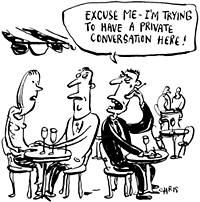
The recent revelation that the National Security Agency has been spying on U.S. citizens without warrant got me to thinking about the nature of privacy in 2005.
Privacy itself is a relatively new concept in human existence. For thousands of years people lived in small bands, tribes and agrarian societies where everyone knew everything about everybody. People slept 5-6 to a room or tent and everything was out in the open as a necessity of survival.
Even in developed early societies like Egypt, Greece and Rome, the family and individual were open books to the state, government, town, village and work unit The group was more important than the individual.
Ancient China, India, and other parts of Asia had no real concept of privacy either.
Certainly the idea of privacy made some strides as the middle ages ended and the renaissance began. The ideas of self-knowledge, humanism, individual rights, individual expression their necessary expectations began to blossom.
It took the "Enlightenment" of the 18th century to crystallize the ideals of privacy to be found in the Constitution of the United States, but even there privacy was regarded more as a protection from government interference than a natural born right of man.
From Guardster: "The evolution of a right to privacy parallels the development of the humanist tradition. A right of privacy is predicated on the belief that each human being has intrinsic value, that is, valuable in and of him or herself. Respect for this belief becomes the fundamental source of all human rights.
Humanism reached its greatest flowering in the works of such a diverse set of thinkers as Voltaire, Montesqueiu, Diderot, Hobbes, Rousseau, Bentham, Gibbon, Hume, Adam Smith, Kant, John Locke, Benjamin Franklin and Thomas Jefferson."
These concept grew and flowered during the 18th and 19th centuries but "privacy" as we have known it in our lifetimes is a construct of the 20th century. We have gotten used to the idea of compartmentalizing and keeping private our thoughts, actions, expressions, relationships, work, thoughts, desires, rights and loves.
The idea that we have an innate right to keep our lives our own is an essential part of the Western psyche.
It seems though that the idea of the unassailable rights of privacy are being changed in ways we cannot even measure yet.
Lets looks at some of the technological perks we enjoy today.
-Google Earth - (satellite tech for the masses)
-Free Email - (remember there is a server somewhere recording every email and IM word you ever write)
-TIVO - Records all you viewing habits
-Cheap Mobile phone service - As the mobile phone becomes the mobile computer all of your music, computing, video and calling preferences are recorded by the host company
-Discount Cards at the Supermarket -(for that $2.00 you save the Supermarket gets a weekly demographic study of your buying habits)
-EZ Pass - all your movement by vehicle are traced
-"Onstar" for your car, same result as above
-Credit Cards - (have become the barometer of information on what you are worth)
-Drivers Licenses (now contain and will contain more of your life story)
-All of the super high tech microphones, cameras, closed circuit TVs, and computer spyware that make it easy to keep track of everything you buy, say, do, and even think
The list goes on and on. Never mind the information we voluntarily give up in places like blogs.
The 20th century concept of privacy is being fundamentally changed. I believe that the real story behind the ongoing wave of exponential technological change is the way in which we will now relate to each other, marketers, companies, governments and religion in terms of privacy and the fundamental expectations thereof.
We may very well be heading back, thanks to technology, to sleeping six to a room.


